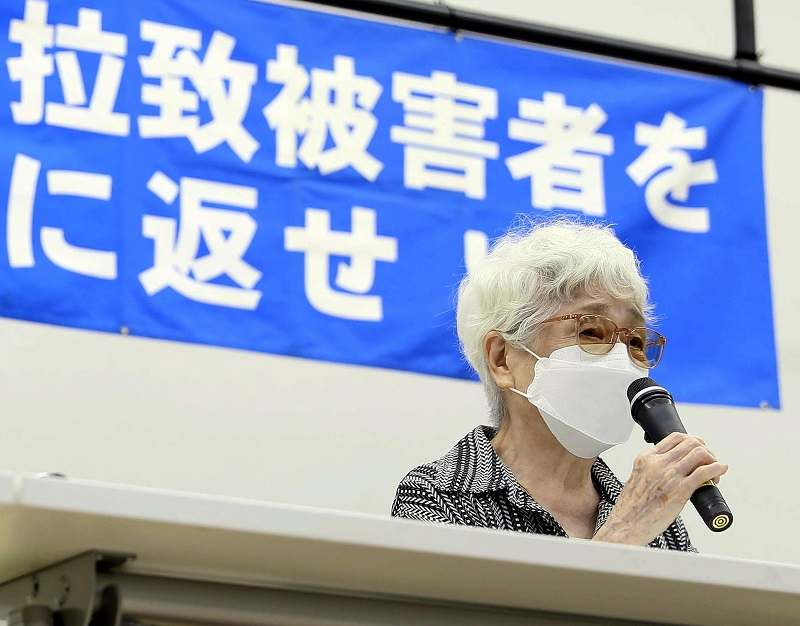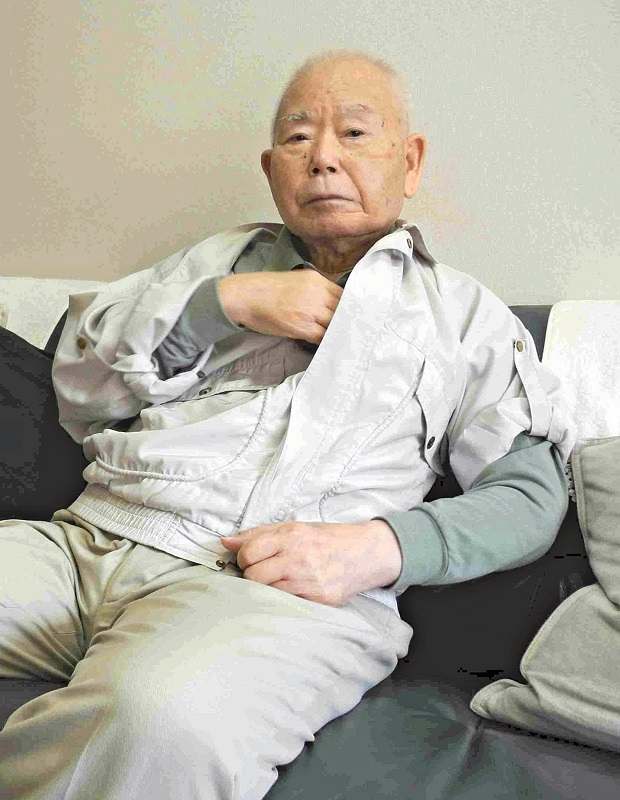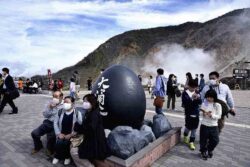In search of lost time 20 years after Pyongyang summit / Long fight to bring abductees home from North Korea takes toll on parents

Sakie Yokota calls for the rescue of the remaining abductees at a gathering in Bunkyo Ward, Tokyo, on Sept. 16.
The Yomiuri Shimbun
6:00 JST, September 23, 2022
This is the second installment of a five-part series reflecting on the experiences of Japanese nationals abducted by North Korea, some of whom have returned to Japan, and their families over the past 20 years since the 2002 Japan-North Korea summit.
***
Sakie Yokota, mother of Megumi Yokota, who was abducted by North Korea at age 13, has physically weakened in the 20 years since the Japan-North Korea summit meeting. Now age 86, she finds it hard to speak loudly and delivers long speeches at gatherings less often than before.
But she forces herself to continue activities to rescue her beloved daughter and other abduction victims.
On the evening of Sept. 16, Yokota held a microphone on a podium at a gathering held in Tokyo. As the first speaker, she said, “While I have wondered what she was doing now or how she was being treated, years and months have passed, giving me stomach pain.”
She left the venue before the gathering ended.
Yokota’s daily life starts with talking to a photograph of her husband, Shigeru, who died two years ago at 87. “Good morning, darling,” she says.
She places a cup of sake, which he liked, and flowers in front of the photo. Before going to bed, she talks to the photo again, saying things like, “Today, there was such and such affair.”
Yokota recalls Shigeru always being beside her during the struggle to bring back their daughter. “He devoted all of his physical, and emotional power,” she said.
It was Nov. 15, 1977. In Niigata City, where the Yokota family then lived, Megumi was abducted while going home from school after her badminton club practice.
The Yokotas appeared on TV programs together to seek information about Megumi and went to police stations in places where unidentified corpses were reported to have been found.
In those years, Megumi’s younger brother Takuya, now 54, saw his father quietly weeping alone in the bathroom.
Takuya himself was hit hard by Megumi’s disappearance, but also remembers the pain of thinking how deep his parents’ sorrow was.
It was in 1997 when suspicion that Megumi might have been abducted surfaced. Shigeru and Sakie, who were worn out as Megumi’s whereabouts had been unknown for 20 years, gained a slight hope they might be reunited with their daughter.
In the morning on the day of the summit meeting, Shigeru was smiling, expecting that Megumi would return to Japan, but Sakie warned him saying: “As the nature of that nation is totally different, we don’t know what will happen. So it’s best not to be so joyful.”
Sakie’s worry was correct. The outcome of the meeting was unacceptable for the Yokotas. Megumi’s name was among eight abductees whom North Korea said were already dead.
At a press conference, Sakie took the microphone as if she was snatching it from Shigeru, who was weeping, and said all in one breath: “I can’t believe the announcement, which does not even clarify when she died. I shall continue to fight believing she is still alive.”
North Korea’s explanation was full of contradictions. Abductees who later returned to Japan testified that they saw Megumi after the time when she was said to have died.
North Korea submitted remains it claimed were Megumi’s two years after the summit meeting, but DNA analysis of the bones proved that they were not hers.
Sakie said, “Even if we are told she died and are given bones, no parents can easily reply, ‘Yes, I understand.’”
Until Shigeru fell into poor health, the couple delivered speeches as many as 1,400 times across the nation.
Sakie said: “Next year, I may no longer be among the living. But I want to see Megumi even for an instant.” Holding onto this hope, Sakie encourages herself.
‘Japan is unreliable’
During the 20 years since the summit meeting, eight parents of 17 abductees who the government recognized have died without being reunited with their children.
Currently, only two parents of the abductees are alive. They are Sakie and Akihiro Arimoto, 94, the father of Keiko Arimoto, who was abducted at age 23.

Akihiro Arimoto
Akihiro said at his home, “Though I have fought for many years, I’m also unable to live for many more years now.”
His wife, Kayoko, died two years ago at 94. He feels lonely in the house in Kobe where she used to be with him.
Keiko went missing in 1983 in Britain, where she was a student. About five years later, a letter that reached a family of another abductee revealed that Keiko was in North Korea.
On behalf of Akihiro, who was busy with his job, Kayoko often went to Tokyo to urge the rescue of their daughter by visiting the Foreign Ministry and other places.
Akihiro said his wife “had worked so hard doing what she could without any complaints.”
Jan. 12 is Keiko’s birthday. Kayoko had always cooked special meals and baked a cake, and the Arimotos celebrated their daughter’s birthday together. Now, even that has become impossible.
When Kayoko passed away, her last words were, “My only regret is about Keiko.”
“I wish somebody would teach me how to rescue Keiko,” said Akihiro while rubbing his weakened legs and expressing his frustration. “Japan is too unreliable.”
Popular Articles
"Society" POPULAR ARTICLE
JN ACCESS RANKING







